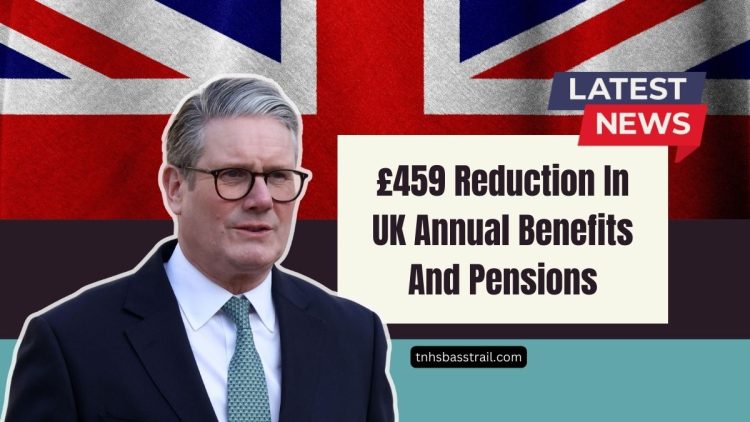Starting in 2025, millions of people in the UK are facing an average annual reduction of £459 in benefits due to several key changes.
These include cuts to Winter Fuel Payments, adjustments to Universal Credit, stricter eligibility for Personal Independence Payments (PIP), and changes to the State Pension.
This article explains what these changes mean, who will be affected, and how you can prepare for the financial impact.
Key Changes to UK Benefits and Pensions
The £459 cut in UK benefits is one of the most significant reductions in welfare support in recent years. While some payments, like the State Pension, will see modest increases, the net effect for most individuals will be a financial loss due to cuts and tighter eligibility rules. Here are the key updates:
| Change | Details | Impact |
|---|---|---|
| Winter Fuel Payment Cuts | Limited to pensioners receiving Pension Credit only | Loss of up to £300 per pensioner |
| Universal Credit Adjustments | 1.7% increase, but health element reduced to £50 for new claimants | Real-term reduction in disability support |
| PIP Eligibility Tightening | Stricter criteria from November 2026 | Potential disqualification for thousands |
| State Pension Increase | 4.1% rise from April 2025 (to £230.05/week) | Roughly £460 more per year |
| Net Effect | Overall benefit reductions outweigh increases | Average annual loss of £459 |
What’s Behind the £459 Benefits Cut?
The government’s Department for Work and Pensions (DWP) has stated that the reductions are part of efforts to ensure the financial sustainability of the welfare system.
The main aim is to encourage more people to work, reduce dependency on long-term benefits, and modernize the welfare state.
However, the cuts have been met with criticism, especially from vulnerable groups such as pensioners, disabled individuals, and low-income families who depend heavily on these benefits for their day-to-day living.
Critics argue that the changes disproportionately impact those already struggling with rising living costs.
Detailed Breakdown of the Changes
1. Winter Fuel Payment Cuts
- What’s changing: From 2025, only pensioners who receive Pension Credit will be eligible for the Winter Fuel Payment. This reduces the financial support for many pensioners.
- Example: A pensioner who previously received £600 (Winter Fuel Payment + £300 Cost of Living top-up) could now see a reduction to just £100–£200.
2. Universal Credit Adjustments
- What’s changing: The base rate of Universal Credit will rise by 1.7% starting April 2025. However, the health element for new claimants will be capped at £50 per week—a significant reduction from the previous rate of £97.
- Impact: Disabled individuals, particularly those with long-term conditions, will face financial challenges with these reductions, impacting their ability to meet basic living expenses.
3. Personal Independence Payment (PIP) Eligibility Tightening
- What’s changing: PIP eligibility criteria will become stricter starting November 2026. Claimants will need to score at least 4 points in a single daily living activity to qualify, and the review process will be automated.
- Impact: Many people with fluctuating or mental health conditions may lose access to this critical support, as the tighter criteria could disqualify thousands of claimants.
4. State Pension Increase
- What’s changing: The State Pension will rise by 4.1% starting April 2025, bringing the weekly amount to £230.05.
- Impact: For those who qualify for the full amount, this increase will provide an additional £460 per year, offering a slight relief amidst other benefit cuts.
How to Prepare for the £459 Cut in UK Annual Benefits and Pensions
To minimize the impact of these changes, here’s a step-by-step guide on what you can do:
1. Check All Eligibility
- Visit the GOV.UK benefits calculator to check if you qualify for any additional support or changes in your current benefits.
- If you were denied benefits before, it’s worth rechecking your eligibility as circumstances may have changed.
2. Apply for Pension Credit
- Over 850,000 pensioners have yet to claim Pension Credit, which can unlock additional support such as Council Tax discounts, cold weather payments, and even a free TV license for those aged 75+.
3. Contact Local Support Services
- Turn2Us, Age UK, and other charities offer emergency financial grants for heating, food, and rent. Consider reaching out to these services if you’re struggling with everyday expenses.
4. Appeal or Challenge Decisions
- If your benefits have been reduced or removed unfairly, you can appeal. Seek help from Citizens Advice or a welfare rights advisor to ensure your case is heard.
The £459 cut in UK benefits and pensions for 2025 is a significant financial burden for many pensioners, disabled individuals, and low-income families.
While some will see modest increases, particularly in the State Pension, most recipients will experience a net loss in support. By checking eligibility, applying for Pension Credit, and seeking additional support through local services, you can help mitigate the effects of these cuts.
Understanding the changes and planning ahead will be essential in ensuring that you continue to receive the financial support you’re entitled to.
FAQs
How much will I lose from my benefits in 2025?
On average, UK households will experience a £459 annual reduction in benefits due to various cuts and changes.
How can I qualify for Pension Credit?
Pension Credit is available to pensioners with a low income, and it can unlock additional benefits such as Council Tax discounts and a free TV license.
When will the changes to the Winter Fuel Payment start?
The changes to the Winter Fuel Payment will take effect in 2025, with cuts to the payment amount for pensioners not receiving Pension Credit.

